|
Welcome to A&A. There are 35 reviews in this issue. Click on an artist to jump to the review, or simply scroll through the list. If you want information on any particular release, check out the Label info page. All reviews are written by Jon Worley unless otherwise noted. If you have any problems, criticisms or suggestions, drop me a line.
|
|
|
A&A #152 reviews (2/9/1998)
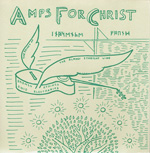 Amps for Christ
Amps for ChristThe Secret of the Almost Straight Line 7" (Westside Audio Laboratories) Recordings of apparently homemade instruments, highly processed and warped. The liner notes are almost as obtuse, consisting of a couple of vaguely poetic essays. One that shares its title with the single itself could be a scathing repudiation of the Luddite movement (among may other things), though it's so elliptically written I can't really make sense of it. The music itself has the fascinating characteristic of working equally well at 33 and 45 (though it's supposed to be played at 45). Much of it sounds like really tinny bagpipe stuff, though there's a weird psuedo-country song (that lies in a bed massive static and distortion), a sitar raga and a couple J. Mascis-esque guitar pieces. Unusual and certainly appealing. For such a lo-fi result, it's easy to hear how much thought and preparation went into this recording. Quite possibly the future of pop music.
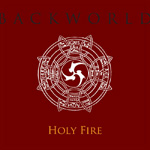 Backworld
BackworldHoly Fire (Harbinger House-World Serpent) The gothic gothic, soundscapes of stark horror, punctuated by a wide-ranging examination of religion in our time. Quotes from the Bible and many philosophers, samples of David Koresh and other recent "prophets". All combining to create a surreal reality which, despite its seemingly incongruous nature, is in fact a perfect mirror on our struggles as a society to find spiritual peace. The usual hardcore gothic instrumentation: acoustic guitars, strings, a clarinet and overwashing keyboards. The arrangements are lush, but not overwhelming, with the samples serving as both rhythm and dramatic elements. In a weird way, like My Dying Bride without the excess. The song subjects are similar, and while Backworld never ratchets up the guitars, the passion burns intently. Following the Zen model, the questions are more important than the answers. And that makes the intriguing lyric content at least as important as the intricate music. A complete package, the journey of mind toward fulfillment. Contemplative, but not wishy-washy. Backworld manages to probe the spiritual world without getting either preachy or goofy. Some achievement, that.
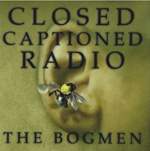 The Bogmen
The BogmenClosed Captioned Radio (Arista) The second album from this pop band (pop in the vaguest of ways; as the Bogmen don't stick to one sound for long), and the package was replete with rather excessive pronouncements of world domination and the like. The Bogmen aren't THAT good. But singer Bill Campion sounds like a cross between Guy Kyser (Thin White Rope) and Axl Rose, in his crooning moments. So drop that voice over a wild landscape of generally excessively orchestrated pop music, and the proceedings do fall into place. Most of the time. Unlike Muckafurguson, another band that throws everything into its sound, The Bogmen had a serious studio budget, and every penny was used. Many songs have one or two overlays too many, and sometimes even the songs themselves are overwritten. Some stripping down is needed. Yeah, this stuff is good enough, but when you've got folks with this sort of talent and charisma, why hide them behind a wall of studio tricks? Let the boys come out front and center and stake their own claim to greatness.
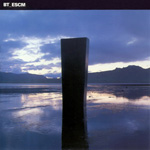 BT
BTESCM (Perfecto/Kinetic/Reprise) The further evolution of ambient music. As evidenced on Robert Miles's works, there is a confluence not only of the industrio-techno and ambient arms of electronic music, but also new age and space elements. BT (Brian Transeau) whips all of these ideas and more into a sound that isn't quite trance, isn't quite ambient and most certainly isn't new age. And yet, folks who dig all those can find parts they like. The beat work is subtle, but still involved. It just lies beneath the surface of many of the songs, poking its head out once in a while to add a little bounce to the proceedings. The songs generally fit an ambient structure, with waves of lines washing over each other, though when the beats predominate, there is a definite techno club feel (though "Lullaby for Gaia", one of the upbeat tracks, is straight out of Flock of Seagulls). BT isn't great at mixing his influences; he generally moves from one to the other. The transition is seamless, but I'd like to hear more interplay. A very nice disc, with all the good and bad connotations that brings. Good in that it's extremely listenable. Bad in that few chances were taken in the songwriting. The songs do not seem to be making much of a statement. They're mostly just there to be pretty. Nothing wrong with that, I guess, though I demand more.
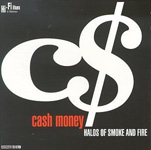 Cash Money
Cash MoneyHalos of Smoke and Fire (Touch and Go) The cover may say "Hi-Fi Blues", but most every song on this album was recorded live to two-track, with the volume slides pinned to the top. Heavily distorted, throbbing examination of just what it means to dig the blues. For the uninitiated, the main components are John Humphrey (best known, I guess, for his guitar hacking with God & Texas) and Scott Giampino (best known for sending me lots of cool stuff from Touch and Go, and also a fine drummer in the John Bonham style). You might think that the sound would turn out thin or otherwise not as full as, say, a band with a bass player. Well, for one, Humphrey generally sticks to the lower three strings, and anyway, the fuzz-factor (angry stuff, not any of that pop fizz) is completely overloaded. Yes, this is the blues, and while Cash Money works its ass off to stay true to the olden days, current recording technology and modern equipment (mikes and the like, not computers, mind you) do help to produce the low, crashing wail that is a Cash Money trademark. Wild music, pure and simple. The way good ol' rock and roll should be flayed. Yeah, you can hear nods to a couple newer bands (Mule and particularly the Laughing Hyenas), but that comes from a sharing of influences (listed in the liners as Johnny Cash, Freddie King, Led Zeppelin, ZZ Top and Elvis Presley. Inclusive.). Thick, mean and utterly intense, Cash Money embodies rock and roll possessed by the spirit of the blues.
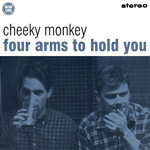 Cheeky Monkey
Cheeky MonkeyFour Arms to Hold You (Big Deal) Cheeky Monkey is but two people, Michael Shelley and Francis McDonald. The story as related in the bio is that Shelley heard some singles McDonald put out on his own label. Luckily, as McDonald has played with such acts as Teenage Fanclub, The Pastels, Eugenius and most recently BMX Bandits, he's a fairly well-known guy. The two begin to correspond, and in short order began writing songs over transatlantic phone lines. Luckily (and this part doesn't exactly seem like coincidence), both are currently recording for Big Deal. Now, what album wouldn't love to put out an album that features two of its artists. Can you say supergroup? Well, luckily, Big Deal didn't. But the result of three days of frantic recording in Scotland has turned out a rather cheery sounding disc. Not that the lyrics reflect this happy veneer. In the finest pop tradition, there are completely bizarre tunes, like the rockabilly-style raver "Chase Each Other Around the Room" which sounds a lot like the George Michael tune "Faith" with S&M lyrics and surfpop harmonies. Really. The music is pure confectionery, whipped up into the most appealing shapes. The lyrics sometimes slip into that territory as well, but I'm not gonna quibble. This is fun stuff. Sure, there are definite references to Big Star (as on just about any album released by Big Deal) and the pantheon of pop greats, but why whine? Breezy and refreshing, Cheeky Monkey is a collaboration that lives up to at least the sum of its parts.
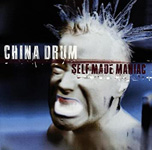 China Drum
China DrumSelf Made Maniac (Mantra-Beggars Banquet) The sort of sound and concept that Chumbawamba abandoned on the way to worldwide fame. Punk-tinged up-tempo pop music with thoughtful lyrics, sensitive stuff shouted out with abandon. Actually, this stuff is quite well-produced, but the anger and pain can easily be heard in Adam Lee's insistent vocals. Brit pop, with enough American references to possibly appeal to a few kids over here. I'm afraid the lyrics are probably a bit too involved for passive listening, but this is only a comment on potential commercial success, not actual quality. And China Drum is just fine there. In fact, all the songs are appropriately textured without excess, catchy tunes that still manage to convey a sense of outrage. A lot like the Clash, really, in substance if not in style. Let's get real: Folks don't give a damn about the lyrics. China Drum's music is utterly addictive, shiny enough to get some mainstream attention even while the quality will appeal to more demanding connoisseurs of pop. The more I listen to this album, the more I like it. This one has a shot at entering my personal canon.
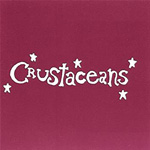 Crustaceans
CrustaceansCrustaceans (self-released) A huge wad of songs that range from the easy-going indie-MOR style of Natalie Merchant's solo stuff to fairly involved emo-lite pop stuff. All three members play guitar, drums and guitar, and all three sing from time to time. Most of the time, though, Samantha Jones sings, which brings the sound more to that vaguely syncopated Grateful Dead twice-removed sound (Poi Dog Pondering, the Sundays, whatever). While Crustaceans plays this stuff at least as well as anyone else I've every heard (the sparse production really helps to move the songs along), I'm still not a fan. Of course, the band does move around, and for all the songs I really don't like, there are a good number that do work for me. Crustaceans feature some really nice interplay between the guitar and bass, and often enough the pop concept wanders into Thingy/Heavy Vegetable territory, which is certainly a happy land for me, indeed. Perhaps a bit too varied, Crustaceans does not sound like a band confident with its sound. Talent? Yeah. Songwriting? Good enough. It's great to have diverse influences, but the real trick is incorporating those ideas into a somewhat coherent framework. That's where the work is needed.
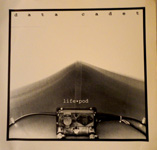 ���
Data Cadet ���
Data CadetLife*Pod 7" (Westside Audio Laboratories) Languid, but still rockin', noise stuff, replete with whorls and squelches of distortion and lots of fine riffage. Goofy and intense, with plenty of punch. Kinda like listening to a radio station which keeps going in and out of phaze between a radio station playing Space Streakings and another playing some 70s lite rock. Each is just out of range, sometimes bleeding into each other and sometimes utterly fading to black, with an omnipresent layer of white noise coloring everything. Wonderfully disturbing fare, completely askew from the normal, acceptable standards of society. There comes a time when lunatic rantings begin to make sense. We just might have reached that point.
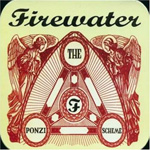 Firewater
FirewaterThe Ponzi Scheme (Jetset) After such a brilliant debut as Get Off the Cross... We Need the Wood for the Fire (that particular album is one of the 10 best ever recorded, IMHO), I wondered if the band could even come close to such brilliance the second time out. Adding to my trepidation is the fact that more than half the band is new for this effort. But still, when I got a call a week ago saying this puppy was on the way, I kept an eye on the mail slot just the same. The highly orchestrated sound (replete with piano, saxohpone and strings) has remained (though there isn't quite such a reliance on klezmer melodies and rhythms), and Tod A.'s sneering, sarcastic spiels are as biting as ever. The songs crash on top of each other in apocalyptic fashion, each struggling to build up from the rubble left behind. This is mean, nasty music, and yet it has all the trappings of "big rock" (a term I'm borrowing from Sam at Jetset, thankyouverymuch). Over the top anthems with gorgeous sound and real, actual things to say. So the only thing to ask is, does this disc beat the first one? No, but just because this album isn't such a revelation. I have heard it before, from this band. The fact that these 12 songs are as strong as the dozen on the first notwithstanding, Firewater is still in danger of being hailed as one of the greatest bands around, period. I won't do that, because it's something like the cover jinx. No band that I have excessively praised has ever sold many records. Brilliance, again. Sure, this album proves that the visionary behind the band is Tod A., and I guess it doesn't matter so much who's playing behind him. All that's left to say is that I've already played this thing three times, while attempting to write this review. My mind is devastated, but my heart is soaring. Throbbing, bursting, exploding with joy. This music speaks directly to my soul, shining a new slick of oil on the darkness.
���������������������������������� 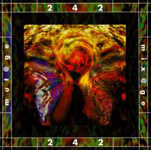 Front 242
Front 242Mut@ge.Mix@ge (RRE-Play It Again Sam) A 1995 compilation of remixes done by such current luminaries as the Orb and the Prodigy. I'm guessing this puppy is getting dusted off to take advantage of the current fascination with electronic music. Not necessarily a bad thing, if the stuff is good enough. It's not. Electronic music has a problem of getting dated awfully fast, and these mixes are emblematic of the early 90s, not today. So most of the mixes are spacey, ambient stuff. Not bad as that goes, but nothing exciting, either. If you have paid any attention to electronic music during the past few years, you've heard all this before. I wish I could be a bit more complimentary, but the mixes don't explore the possibilities of the original songs very well. This is not the sort of stuff that brings a warm sense of nostalgia. I doubt it will bring much cash, either.
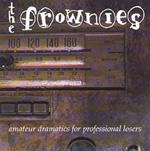 The Frownies
The FrowniesAmateur Dramatics for Professional Losers (Farewell Records) The boys acknowledge a serious debt to NOFX, but they don't pay it and get on with their music. Other than a couple extremely bland ultrapop pieces, this is the sound of three guys who like to sit around, throw six NOFX discs in the machine and play name that tune. They could each do it in one note, I'm betting. Like any photocopy, the Frownies don't measure up to their heroes. The song lyrics focus a lot more on personal subjects, but that doesn't make them terribly intriguing. The music is even more basic, which takes a certain skill and determination. All right, I've ripped long enough. I can hear that the Frownies mean well, and they haven't (consciously, at least) stolen any songs outright. There is a nice energy level to the playing, and shit, I'd rather listen to this than Blink 182 any day. That, however is not a ringing endorsement. My advice is simple: get your own sound, guys. Find a couple other influences, mix them all up and create a whole new approach. Then folks like me won't be such utter dicks when it comes to reviewing your music.
������������������������������ Guchlrug New Age Rib Cage (self-released) Easily one of the most inventive bands I've ever heard. That's definitely saying something. And I don't think any of the members have left their teens. I loved the demo tape I heard about a year ago, and this disc simply reinforces my belief that there's some serious talent stewing here. The recording is primitive, with lots of tape hiss. I'm pretty sure this was recorded in-house. Or more likely, in-living room. But that only adds to the charm. Guchlrug doesn't conform to any single musical concept, and very few songs follow anything that might be called traditional construction. And yet, the stuff is inordinately appealing. Now, one unifying theme is humor. It's a fairly sophisticated sort of humor, generally deadpan and definitely not pretty. Well, not off-color, but just plain weird. Precisely the way I like my jokes. If you can imagine three kids assaulting society with a Mothers of Invention-style attack, well, you might begin to understand. But probably not. There are very few people who can create music of such sophistication and innovation. Guchlrug sounds like nothing else on the planet. And for that reason and that reason solely, I love this band to death. Now, if I could only explain what I'm hearing. Well, you're just gonna have to trust me.
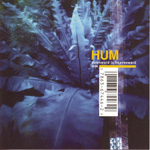 Hum
HumDownward Is Heavenward (RCA/BMG) A long way from the first record I heard from these folks. The thing was on 12-inch Records, and in fact was hand-delivered by label proprietors Poster Children to the college radio station where I worked at the time. A long way, and yet a short journey. Hum is still plying a spacey form of grunge pop, with cascading chords and the odd hooky chorus to tie things all together. Radiohead is an obvious connecting point (grunge and prog all the same now, in a weird sorta way), though Hum is definitely grounded in middle American music. Easy to get lured in. Hum's sound is listener-friendly, rather inviting, really. Once inside, though, I'm a bit disconcerted by the lack of depth. The music is much less complex than it seems at first. And while the lyrics follow the semi-literary form of "indie rock", they're not any more perceptive than most. Still, the stuff goes down like a dream. Not a great album, but one that makes for a nice listen. I'm not sure if you understand what I'm getting at, but what the hell. Really sharp sounding at first, but kinda generic underneath. Cool enough for another listen, though.
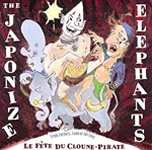 Japonize Elephants
Japonize ElephantsLe Fete de Cloune-Pirate (Secretly Canadian) What more is there to say about a band which can whip from a hoedown to the Hora faster than you can say "Holy seltzer, Batman!" And it's not like the Elephants limit themselves to the canon of the redneck Jew. That's just an example. The main point is really wacky songs, accompanied by truly masterful music that hits on Eastern, Middle-Eastern and trailer park influences. Yeah, the lyrics are goofy, but these folks can really wail. And instead of merely refining some sort of musical chaos, the Elephants create their own musical reality. While in our dimension these sounds may sound rather incongruous, in this Bizarro world the Elephants are the epitome of great music. Of course, I live in that world all the time, so I'm happy to proclaim the greatness of this band. Way too much fun for such fine music to be lurking about as well. That's really the most impressive part. These songs are meticulously written and arranged, and while it sounds like a manic whirlwind of sound, the underlying structure is completely sound. Another extraordinary opus. Probably not for the masses, but definitely for anyone who searches for truly fine music.
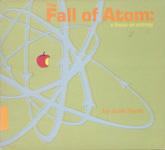 June Panic
June PanicFall of Atom: A Thesis on Entropy (Secretly Canadian) Another of the rather prolific members of the Secretly Canadian stable. The last full length (which I got last July) had 28 songs, and this puppy has 24. Let's also not forget the five songs released on a split LP with Intro to Airlift last fall. Talk about cranking the stuff out. And like Matthew Sweet, there is a penalty to pay for being so prolific. A few clunkers, and other songs that definitely could have benefited from a re-write or two. Still, the vast majority of the songs are great, a kind of sloppy pop music that endears, even while eschewing such concepts as hooks, tuning and good singing. In fact, the whiny, nasal vocals can get grating. But these songs would not work with a stereotypically fine singer. So I'm inclined to think this style actually helps make these unusual songs work better. Highly introspective fare, idiosyncratic and somewhat annoying. On the whole, though, I'm a big fan. In fact, I can't think of anyone who cranks out so much stuff with such consistency. Impressive, to say the least.
������������������������������ 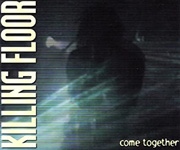 Killing Floor
Killing FloorCome Together CD5 (Reconstriction-Cargo) As anyone who's heard the album knows, this is NOT the Beatles song. And there are two album tracks, the title one and "About to Break", with remixes of "Tear it All Away" (by Institute of Technology), "About to Break" (by Alien Faktor) and "Wood" (by Christ Analogue). And unlike quite a few remix sets, these reworkings do make solid and creative improvements on the originals. The three remixes are all rendered extremely club-ready, punching up the beats and the general rhythmic tendencies. More, really, would be nice. I don't often say that, but what is here is of the highest quality. A remix set that is worth the cash.
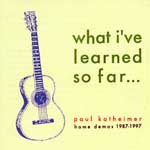 Paul Kotheimer
Paul KotheimerWhat I've Learned So Far... Home Demos 1987-1997 (The Hand-Made Record Label) As you might guess from the guitar on the cover, Kotheimer is a singer-songwriter type of guy who records his own stuff wherever he finds space and time. Much of the time he sounds like he's trying out new styles of playing and singing (though always hanging out around the whole folk-rock ideal). His lyrics are very mundane, though many times all that everyday stuff piled together adds up to something greater. Kotheimer has an easy-going style of playing, one that compliments his somewhat ragged voice. Sure, he wants to be Springsteen (like a few million other folks I know), but he's also willing to focus on what he does well, which is sing earnest songs about the stuff he sees and feels. Kinda like... Occasionally quite perceptive, Kotheimer manages to bring a certain nobility and grace to lives that many of us would consider terribly dull and uninteresting. A nice, contemplative set.
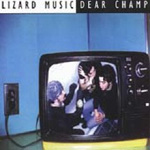 Lizard Music
Lizard MusicDear Champ (World Domination) I found their first WD album to be woefully incoherent. This was a problem because the band styled itself as a pop act. But I liked the idea of playing around with the form. So this disc comes around. Much tighter, with a lot less experimentation. Or, more accurately, the experimental moments are much better integrated into the whole. Pop music with plenty of edge, even some moments of true inspiration. Yeah, this time it worked out. At times Lizard Music still tries to infuse some cacaphony into sickly-sweet tunes, a bad habit I didn't like on the first album. But when that happens here, it's much easier to hear to joke. No question about it. A definite improvement. A quality pop album, still somewhat inconsistent, but not overly so. Lizard Music has learned to control its excessive impulses well enough to craft some fine tunes. Good work.
Moc Moc Entropy (self-released) Prog pop, with the occasional infusion of horns. Not nice horns, but the kind that wake you up in the morning at Scout Camp: blaring, nearly incoherent. The songs themselves are built around the interplay of the bass and guitar, both of which follow intricate paths, only occasionally coming together for a quick smooch. Kinda like Yes playing Big Star, with a nod to, say, the first Primus album. Though the rhythm instrument that drives these songs is the drums (the other players are generally lost in their own realities). The result can be maddening, particularly when the members get completely lost and resort to the "metal meltdown" (fast strumming of the guitar and bass, with rising intensity) as a method of advancing the process. That doesn't happen too much, though. Much of the time Moc Moc meanders through a garden of technically well-executed licks, while grinding the sound down enough to leave just a bit of a beveled edge. I think this album may actually sound better than it really is. At the core, I can't find much. There's a ton of great playing, and the songs are wonderful to traverse. The heart of the enterprise is something I can't quite discern, maybe because of the rather improvisatory style of the songs. For such an ambitious undertaking, though, Moc Moc has done a damned good job.
������������������������������ 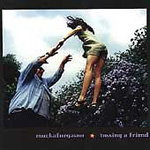 Muckafurgason
MuckafurgasonTossing a Friend (Deep Elm) I thought the seven-inch was a wild ride, and there were only four songs there. This disc has 14 (three of which are from the single), and while the sequencing makes the shift between songs somewhat less jarring, there's no escaping the fact that Muckafurguson is one of the most inventive bands around. Mostly pop, though with more side references than you can imagine. The liner picture is of a mixing board, with labels such as "country", "rap", "old timey" and "indie" taped over the slides. I'm not sure the levels indicated are dead-on, but you get the idea. Muckafurgason ain't much for genrefication. The main point here is humor. Sophisticated and crude, taking on just about everyone around. The thing is, the funny bits lie in the music as well as the lyrics. This is highly referenced stuff. Keep peeling back layers and there's still more. Quite simply, there's nothing else that comes even close. If these boys don't become the darlings of college radio (and hopefully more, since that doesn't really mean much, after all), I'd be surprised. Brilliant. Not much more to say than that.
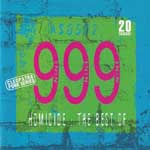 999
999Homicide--The Best of (Cleopatra) I think perhaps the most amazing thing about 999 is that it is still a going concern. The music is easy-going late 70s Britpunkpop, a significantly lightweight version of what the Clash, the Buzzcocks and Elvis Costello were doing. Twenty tracks, and most of that is filler. There are a few decent moments, but at its best 999 wasn't very good. And it's so easy to hear the many different acts the band and its producers were trying to imitate, it's silly. It's amazing that 999 is still doing shows 20 years after embarking on such a minor voyage. Of course, some people are still clamoring for Gilligan's Island, too.
Pop Canon The Kingdom of Idiot Rock (self-released) As the note sez, seven folks in a band with horns, and it's not ska. Not at all. A lot more like Billy Goat. People that try really hard to make amusing music. Trying too hard, really. For such simple music, this stuff sounds way too calculated. The lyrics call upon a wide load of references (when's the last time you heard Uri Geller mentioned in a song?), but there's so much overload that whatever clever bits exist (and there are quite a few) get lost in the general morass. The sound is just overbearing. Too many instruments playing the same lines, lines which aren't that convoluted to begin with. And way too many musical cliches are used to get out of songwriting jams. This sounds like what it is: a local band that packs them in at the bar with spirited performances. The problem with a disc is that you haven't downed a couple pitchers and worked yourself into a sexual frenzy every time you hear it. And when sober, the stuff just isn't nearly as cool.
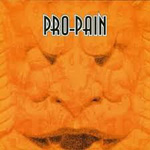 Pro-Pain
Pro-PainPro-Pain (Mayhem) A new label, same old Pro-Pain. Which is pretty damned good. For my money, no one does the whole NYC metalcore sound better. Pro-Pain is not only more prolific than Biohazard, but Pro-Pain is much more raw and exciting. This album finds the boys in a somewhat more contemplative mood. The tunes grind a bit more, but without succumbing to the dirge. Even when tucking with the midtempo, Pro-Pain knows how to keep the fiber flowing, if you get my drift. And there's plenty of cool moshers like "Don't Kill Yourself to Live". There's no need for these guys to prove themselves any more, and yet, each album has outdone the previous one. On this disc, they guys expand their sound a bit, and it works. Still vital. Still essential. Metal may be a bad word these days in some circles, but Pro-Pain is living proof that great music need not worry about its label. Intense and awe-inspiring, as ever.
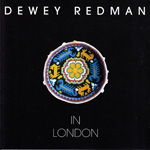 Dewey Redman
Dewey RedmanDewey Redman in London (Palmetto) As a member of the Ornette Coleman Orchestra, Charlie Haden's Liberation Orchestra, a Keith Jarrett Quintet and Pat Metheny's band (all at the right times, of course), Dewey Redman should have no fear for his reputation. And on this live set, he plays just that way: Confident and willing to take chances. And for Redman, taking chances means playing a standard like "The Very Thought of You" in addition to the bop and free jazz pieces that cling to him. And you know what? He plays it all with verve and excitement. Music is still essential. Which is the trick, of course. Redman is ever intense, ripping a huge chunk out of a gorgeous ballad like "Portrait in Black & White" between a couple of his compositions which lean more to the avant garde. Despite the changes in styles, everything still makes sense. The key is the challenge, the drive to create music that speaks to the soul. Redman hasn't forgotten about that. After all this time, he's still aching to play, aching to be heard. And that desire is key.
Rubido roo-beh-do' (self-released) I'm afraid I can't quite reproduce the phonetic spelling of the title on the web site, but you get the idea. Rubido is a four-piece from Nashville, and the band makes terribly serious-sounding music. The sort of thing that major labels like to release and call "important music". I've got other words, like overblown and excessive. Now, since Rubido recorded this thing on a smaller budget, the sound is great, sparse enough to allow the natural power of the songwriting to shine through. Yeah, it's anthemic fare, and the lyrics can be a bit oppressive (there are songs titled "Melodramatic", "Homindae" and "Many Rivers", for example), but enough rootsiness creeps into the guitar rock sound to save the band from its heavy impulses. I'm still thinking that this stuff is just a bit too arrogant, but even so, it works. I truly do like the way the music moves, even if it isn't in one of my favorite styles. And it is nice to hear someone really trying to say something, even if what is said might be just a little preachy. Perfect fodder for superstardom. I mean, I'd rather hear this stuff than, say more Hootie or what have you.
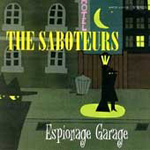 The Saboteurs
The SaboteursEspionage Garage (American Pop Project) Led by Mark Brodie (of Mark Brodie and the Beaver Patrol fame, if you want to call it fame), the Saboteurs are three English-speaking guys who live in Japan and play in a surf pop band. I've got the same problem with this disc as I did with the Beaver Patrol record, and that is that the songs just don't have enough fire in them. They're perfectly good tunes, played with workmanlike skill and the requisite amounts of reverb. But I don't hear any passion, and that's pretty important when you're playing stuff that lends itself to generic qualities rather quickly. Well, the spoken introduction at the start didn't help, either. But putting aside that dreadful (and embarrassing) moment, the album just never picks up steam. Surf stuff for stoners seems a bit too, well, hackneyed, but it fits well enough. Too laid back for me. The Saboteurs are not horrible. In fact the playing is nice, and I rather like the sound they got. But the tunes need more oomph. Not volume, but intensity. As it is, this would lie at the top of (but still, a part of) the anonymous surf pile that sits in the corner.
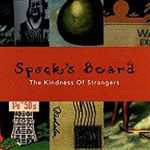 Spock's Beard
Spock's BeardKindness of Strangers (self-released) A more accessible side of prog rock, with folk-rock breaks and a generally watered-down approach to the technical ideal. What got watered down is the devotion to pyrotechnics. Sure, there's plenty of fast guitar licks and classical melody lines. But Spock's Beard infuses this base with more traditional rock vocals and a definite passion. These guys feel this music. And that translates into a more satisfying sound. Of course, this is still prog rock. Grandiose, excessive and generally over-the-top. There are some songs of monster length, and on the last track (which clocks in at just under 16 minutes) there's an intro which plays a bit much with the whole stereo recording thing. I mean, the Beatles got over that 30 years ago, y'know? Still, this disc displays a confident band playing music it loves. Music with purpose and passion. And for all the problems, Spock's Beard knows how to sell a song.
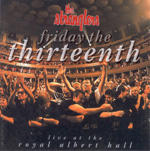 The Stranglers
The StranglersFriday the Thirteenth: Live at the Royal Albert Hall (Cleopatra) Those unfamiliar with the Stranglers will remember the Prong cover of "(Get a) Grip (On Yourself)" of a few years back (though that particular song is not here). Then I'd suggest you do a little research. Not as influential as, say, the Buzzcocks, the Stranglers were a huge proto-punk pop band back in the early 80s. They never quite crossed over to the U.S., and despite making it into stores before the Pistols or the Clash, never got full popular credit for their chunk of the punk ideal. This album, however, won't help. Performed with a full string orchestra, some really great songs are reduced to Muzak-style arrangements. The band sounds old and tired, and Paul Roberts is a poor replacement for Hugh Cornwell. I'm not exactly sure when this change at frontman occurred (my books don't mention a death or anything), but in any case, Roberts is exceedingly dull. One of the reasons folks don't remember the Strangers is that most of their output after 1980 sucks. Albums like this (and this show was videoed for VH1, of all things) reinforce the necessity of such ignorance. Yow.
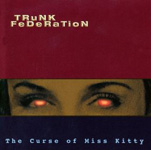 Trunk Federation
Trunk FederationThe Curse of Miss Kitty (Alias) Completely disjointed pop, in much the same style as labelmates Archers of Loaf. Though Trunk Federation throws in a lot of extras, like organ and something that sounds like strings (but might be a synthesizer, who knows?) The songs lurch and reel, paying only lip service to basic verse-chorus-bridge-chorus structure. Trunk Federation's idea of fun is to graft a couple different verses (completely different styles to each) into one song, and tie them together with a chorus that relates to nothing that came before it. Now, from time to time, a conventional pop gem struggles free (say, "Truck Lover"), but the band throttles whatever joy might have been exuded by dropping in fuzz in great magnitude. The cops have a word for it: murder. Me, I kinda like it. Trunk Federation works real hard to warp pop music into another dimension. Not unlike Polvo or other great bands. Does it work all the time? No. But when it does (and that's more often than not) the results are glorious. Strange and beautiful, a wonder to behold.
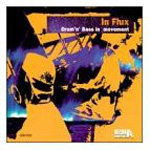 Various Artists
Various ArtistsIn Flux: Drum 'n' Bass in Movement (IRMAmerica-Tinder) IRMA is an Italian label, and most of these tracks are produced by Italian DJs. Still, this is as good a representation of where jungle music has gone in the past couple years. Like everything else, terminology shift quickly, particularly in the trendy world of dance music. So jungle is now drum 'n' bass, which is what the masses call all such stuff now that a couple artists are beginnning to break into the American mainstream.
This collection doesn't break any new ground, but it's chock full of good stuff. Fans of the truly unusual will pick up on the remix of AWB's "Livin' on Borrowed Time", which is quite impressive. As generic as most dance collections, but the Italian connection here gives these tracks a bit of a different feel. Not essential, but an interesting diversion.
 Various Artists
Various ArtistsMagnets at the Bottom of the Sea (Westside Audio Laboratories) A cool tape which contains bits and pieces from 28 different bands (including Morsel, one of my personal faves). As you've probably noted in my recent reviews of WAL releases, this stuff is not for the faint of heart. It's not even for most of the folks who claim to like "alternative" music. This is for folks who like weird shit for its own sake. I'm in that group, and I've been getting e-mail from a number of folks count themselves in the congregation as well. The styles on this tape range from fairly coherent noise pop to utterly insane electronic disturbances. A real range of warped possibilities. The note I got with this drop shipment sez this is the last cassette-only release for the label, and that, indeed, all copies of this tape are covered in (cheap and fake) fur. As for the Easter Seals stamps, well, they weren't mentioned. I don't know what these cost, but I'm guessing about five bucks. Well worth the green if you like exploring the agonized subconscious worlds of some seriously disturbed folks.
 Various Artists
Various ArtistsMyOhioActionPalBoyGoldGod300 (My Pal God-Ohio Gold-Action Boy) A compilation from three Chicago labels that have been passing among themselves many of the artists contained within. The best known of the acts would be Hurl, Dianogah and Lustre King (and this, no doubt, is why these three bands kick off the set), but 90 Day Men, C-Clamp, A Minor Forest and Dis- are all worth a listen as well. About half the songs are previously released. With the exception of Dis- and A Minor Forest, each band has two tracks, one new (or at least previously unreleased) and one that appeared on a recent album or 7". If you are completely unfamiliar wth any of these bands, the style meanders about on the emo side of noise pop. Fans of stuff like June of '44 and the like would be well-served by checking this out. For amusement value only, check out the A Minor Forest cover of "Lady". Maybe not as twisted as Engine Kid's rendition of "Rocky Mountain High", but definitely awfully creepy. Almost too straight, if you know what I mean. These things are being dispatched at cheap prices so folks will check out the bands and the labels. Definitely worth the price of a good pint.
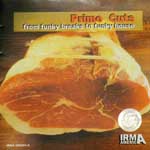 Various Artists
Various ArtistsPrime Cuts: From Funky Beats to Funky House (IRMAmerica-Tinder) Italian disco of recent vintage. So you not only get old school bouncy grooves, but a good dose of latter-day dance music as well. Very poppy, but hell, it's dance music. And that's all this stuff is intended to be. It works, too. The beats are fresh and inventive, and they never let up. I can't say that there's a real "Italian" sound here, but all of the DJs involved do have a deft touch and they know what keeps people on the floor. Fun. That's all. There's plenty of faceless dance compilations wandering about, and this is one of the better ones. Good grooves to go.
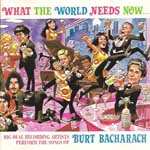 Various Artists
Various ArtistsWhat the World Needs Now... Big Deal Recording Artists Perform the Songs of Burt Bacharach (Big Deal) As every Monty Python fan knows, Burt wrote the music, and Hal David wrote the lyrics. For another pop culture reference to Burt's music, just sit through My Best Friend's Wedding, which uses a good number of the songs (though not the artists) on this compilation. As his best, Bacharach could turn out a truly hooky melody. Like "Rain Drops Keep Falling on My Head". Unfortunately, Shonen Knife completely butchers the tune. It sounds like they never quite figured out the requisite chords. At his worst, however, Bacharach turned out some truly dreadful examples of cheese jazz pop, like "Do You Know the Way to San Jose" (which didn't make it onto this set). There's a decent cross-section of his work here, both good and bad. Played both straight and dripping with satire. But never jokey. In general, the artists on this set didn't outdo many of the previous renditions (no one here came close to the subtle axe-job of Ani DiFranco's version of "Wishin' and Hopin'"), though Dan Kibler's manly take on "Trains and Boats and Planes" and Mitchell Rasor's baroque vision of "I Say a Little Prayer" are quite good, and Cockeyed Ghost gets a nod for utterly whacking "Walk on By" into an incoherent bowl of goo. Necessary? Hardly. There are some moments, though. |
|
return to A&A home page